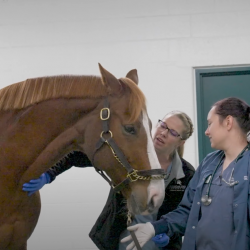DOCP Dosing in Canine Hypoadrenocortism
This study was completed in 2021. The published version can be seen here.
Background: Addison’s disease is caused by the inability of the adrenal glands to produce two hormones, cortisol and aldosterone. If left untreated, this is a severe and potentially fatal disorder that can cause a multitude of clinical signs that range from vomiting and diarrhea to hypovolemic shock (when a dog’s blood volume or fluid levels drastically drop), cardiac arrhythmias, and death. However, with appropriate therapy, most dogs will do exceptionally well. One component of therapy is to replace the cortisol deficiency with an oral steroid (prednisone). This is easy to do and inexpensive. It is equally critical to replace the aldosterone deficiency as this hormone helps maintain normal electrolyte concentrations, fluid balance, and acid-base status. This is often accomplished by a monthly injection of desoxycorticosterone pivalate (DOCP), which mimics the actions of aldosterone and prevents signs of deficiency. Unfortunately, this drug is expensive, and the cost of lifetime treatment can impose a substantial financial burden on many dog owners.
Study Purpose: The purpose of our study is to investigate the efficacy and adverse effects of both low-dose (1.1 mg/kg) and standard-dose protocols (2.2 mg/kg) of DOCP. This study is using a commercially available and approved formulation of DOCP (Zycortal®) during a three-month time period. The efficacy and adverse effects of both protocols are being determined through a series of evaluations and laboratory tests.
An abstract for this study was presented at the 2019 Michigan Veterinary Conference. It also will be presented at the American College of Veterinary Internal Medicine (ACVIM) National Conference in June 2019. The study’s general design can be viewed here and more information regarding informed consent and inclusion and exclusion criteria can be found here.
The MSU College of Veterinary Medicine and Veterinary Medical Center’s Department of Small Animal Clinical Sciences Internal Medicine Service is conducting several studies', one of which offers cost-effective treatments for dogs diagnosed with Addison's Disease.
“We are very excited about the results of this study so far,” says Alysha Vincent, DVM, resident for the Internal Medicine Service. “We are already seeing evidence that the low-dose protocol for desoxycorticosterone pivalate (DOCP) that we are proposing is safe and effective treatment for Addison’s Disease in dogs. We’ve found that the standard dose protocol appears to be more likely to cause abnormalities in dogs’ lab work that are consistent with over-treatment, such as abnormally low levels of potassium.”
Vincent notes that the cost savings of using the low-dose protocol are substantial for many dog owners who visit the MSU Veterinary Medical Center for Addison’s Disease treatment. To give a reference point, the following is information Vincent put together to further explain the cost-efficacy.
- Cost per year for Zycortal (at label dose) for a West Higland White Terrier= $475
- Cost per year for Zycortal (at label dose) for a Great Dane= $2,851
- Estimated life-time cost for Zycortal for a Great Dane (assuming a lifespan of 4.7 additional years after diagnosis) = $15,585
“Now, imagine being able to cut those costs in half,” says Vincent. “This disease is easily treated. So, for most owners who are faced with the decision to treat or euthanize their dogs, it really does come down to cost. Our goal is to make that decision easier by offering an effective, lower-cost option,” says Vincent.



